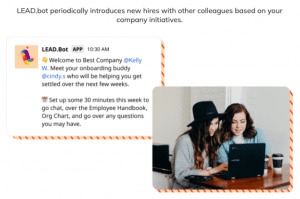There are significant impacts on how a new hire feels about your company. One study shows that 20% of new hires are unlikely to recommend their employer – if this happens to your company, it’s a bad sign for talents who are considering applying to your open positions, and of course, it will hurt your recruiting pipeline. On the other hand, a happy new hire could bring results such as higher productivity, positive company reviews, and higher employee retention.
There are many factors that influence a new hire’s views of your company, but an overlooked aspect is your company culture and the new hire’s sense of fitness in the culture. The impact of new hires on employer brand is why ensuring your new hires feel a sense of belonging with an effective onboarding process is a growing trend, particularly for remote workforces that are learning to adapt to virtual connectivity.
Fortunately, making new hires feel like they belong isn’t difficult, it can be as simple as letting them find lunch buddies. Those small details can even speed up the onboarding process. The sooner your new hire feels comfortable, the sooner they’ll start producing at a high level.
For any hiring managers looking to improve their new hire retention, here are some tips that can help your new employees feel like they belong with your business.
Q: How to create a sense of belonging for new hires?
- Set up a safe space for new hires.
- Connect new hires with other employees.
- Check in with new hires regularly and help them find their voice.
- Let new hires be themselves.
- Organize team-building activities.
- Foster an inclusive and welcoming company culture.
- Provide clear onboarding and training programs.
- Pair new hires with mentors or buddies.
- Recognize and appreciate new hires’ contributions.
- Encourage collaboration and open communication.
- Offer opportunities for professional development and growth.
- Celebrate milestones and achievements of new hires.
Now, let get into some details:
Start By Setting Up A Safe Space
Employment trends have shifted dramatically over the past few years, and workers have found themselves in very high demand. While the high demand is great for job applicants, it translates to potential challenges for employers as the new hires have more choices about where they land. Since workers can quickly find a replacement for their current job, you need to make sure that your company doesn’t do anything that pushes new hires away. In terms of cultivating a sense of belonging, this means setting up a safe space for new hires.
A “safe space” might be difficult to think about, especially for remote workers. So, assess your company culture that might be considered hostile or toxic to external observers. Are these parts of your culture steering someone away? If so, then you’ve failed to set up a safe space for new hires.
To build a safe space for virtual team members, provide digital resources that can help new hires. The resources can include everything from access to counseling to a clear process for dealing with workplace issues.
A safe space mentality can also work wonders for your company culture by helping you retain your existing talent.
Connect New Hires With Other Employees
While remote work has made employees more flexible and satisfied with their roles, organizations often lose organic connections and camaraderie built in the office. To foster a true sense of belonging for new hires, managers should connect them with other team members in an intentional and meaningful way.
One effective solution to form social bonds within the organization is using tools like LEAD.bot, which integrates with Microsoft Teams and Slack. This facilitates organic connections among employees, even across different teams. By encouraging such connections, cross-team collaboration is kickstarted, overcoming challenges posed by virtual workspaces. New hires feel more comfortable discussing issues when they have strong connections with colleagues.


In addition, mentorship programs can further support new hires in feeling like valued members of the team. Implementing virtual mentoring best practices can provide guidance and support to new employees as they navigate their roles and responsibilities. Also, fostering employee resource groups (ERGs) and diversity & inclusion initiatives can contribute to a sense of belonging and inclusivity within the organization. Creating opportunities for ERG discussions and defining clear governance structures for these groups can enhance engagement and foster a supportive work environment for new hires.
Ultimately, connecting new hires with their colleagues, implementing mentorship programs, and promoting diversity & inclusion initiatives are valuable strategies to create a strong sense of belonging for new hires in a hybrid work environment.The benefits of using solutions like LEAD are twofold. Not only does your new hire feel a stronger sense of belonging by forming connections, but you can kickstart cross-team collaboration – something that has become increasingly difficult due to virtual workspaces. New hires also feel more comfortable discussing any issues when they form stronger connections with other employees.
Check In With New Hires And Help Them Find Their Voice
What does your employee onboarding process look like? Do you regularly check in with remote new hires?
When you hire a new worker, block off time each week or so during their first three months to check in with them. Remember, they’re new to your company’s system and may not know who to contact if they have any issues. The feelings of being left out or not heard may cause them to quit, which impacts your employee turnover rate.
However, regular check-in and 30, 60, 90 days check in can mean walking a fine line between ignoring your worker and micromanaging. Think of yourself as a resource to your employee and let them lead check-ins, which allows new hires to build confidence within their new role and your organization. You can certainly use LEAD.bot to schedule periodic one-on-one manager check-ins with your new hire, as well as using pulse surveys built in Slack or Microsoft Teams to collect feedback from each corhort.
Last but not least, checking in doesn’t always have to mean manager check-ins: many studies show that casually checking in with colleagues and buddies can boost employee happiness and improve their well-being as well. This is also something LEAD.bot loves to help with.
Coaching New Managers to Support New Hires Effectively
Coaching new managers is essential to ensure they can provide the necessary support and guidance to new hires during the onboarding process. As new managers take on leadership roles, they must understand the significance of connecting with new employees, fostering a sense of belonging, and helping them find their voice within the organization.
New managers should be encouraged to schedule regular check-ins with new hires during their initial months. These check-ins serve as an opportunity to gauge the new hire’s progress, address any concerns or challenges they might be facing, and offer guidance on navigating the company’s culture and systems. By creating a supportive environment, new managers can empower new hires to speak up, share their experiences, and voice any feedback or ideas they may have.
Coaching should focus on striking a balance between being involved and allowing autonomy for new hires. Managers should act as resources rather than micromanagers, empowering new hires to take ownership of their roles while knowing they have a supportive figure to turn to when needed. Encouraging open communication and active listening can go a long way in fostering a culture where new hires feel valued and heard.
Coaching new managers on these aspects not only ensures a smoother onboarding process for new hires but also contributes to the overall retention and engagement of the workforce. A supportive and inclusive environment, driven by well-prepared managers, lays the foundation for a successful and cohesive team.
Let New Hires Be Themselves
As new hires join your organization, it’s essential to encourage them to be themselves. During the hiring process, you identified their unique qualities and skills, so now it’s time to let them shine in their roles.
Empowering new hires to approach their day-to-day tasks with confidence gives them a sense of ownership and belonging within the organization. When they feel empowered, they are more likely to contribute their best work and fully engage in their responsibilities.
Allowing new hires to be themselves also helps prevent company culture shock. You hired them for their potential and fit within the organization, so it’s crucial to support their individuality and nurture their growth.
While coaching and training are necessary, it’s equally important for managers not to micro-manage. Trusting new hires to apply their unique perspectives and skills fosters a positive and inclusive work environment.
By creating a culture that values authenticity and individuality, you lay the foundation for a motivated and cohesive team, driving success and retention in your organization.














